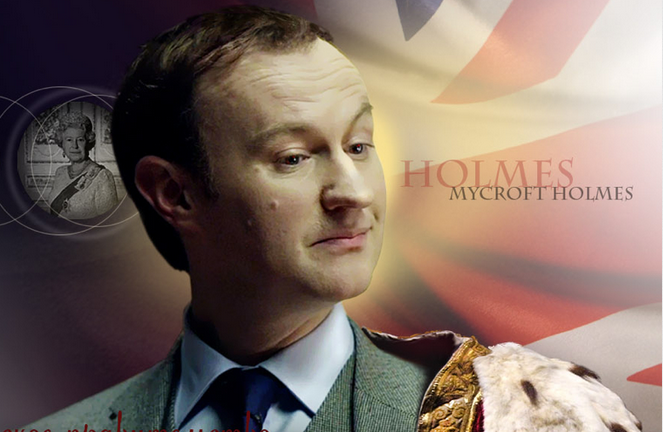
BBC Sherlock Fan Forum - Serving Sherlockians since February 2012.
- Davina
- Moderator
 Offline
Offline 
- From: The Only Way is Essex UK
- Registered: February 9, 2012
- Posts: 9,714
Sherlock- Asperger's syndrome and sociopathy
Fantastic, thought provoking and informative article here. Please read it and the comments that follow it for a clearer view of these two very different, yet frequently confused conditions.
Then put Sherlock into the search and it is the first article. For some reason the apostrophe needed in the link is getting dropped but the time it goes to search and the article doesn't come up on the link.
Upon reading this it is pretty clear that although Sherlock labels himself as a high functioning sociopath he has Asperger's syndrome. I will draw your attention to one comment which is that he prefers the label 'sociopath' over 'autistic' because society pities autistics and fears sociopaths. If he were a sociopath he would never, ever choose to sacrifice his reputation and himself for his friends as his own reputation and social power would have far more sway than human life.
Also it seems to me that if Sherlock has Asperger's syndrome then actually it is Jim Moriarty who is the high functioning sociopath. He has no emotional empathy but has heightened cognitive empathy- although he finds Sherlock harder to 'read' than a neurological typical person. He knows what people are thinking and readily manipulates them. He has carried out 'criminal acts, chronic lying (perhaps) , physically assaulting others (perhaps), disregard for others' safety and needs, and a lack of remorse for one's actions'. "People have died!" "That's what people do!"
I look forward to hearing your own responses to this article.
![]()
Last edited by Sherlock Holmes (June 30, 2012 3:13 pm)
---------------------------------------------------------------------------------------------------------------------------------------------
Don't make people into heroes John. Heroes don't exist and if they did I wouldn't be one of them.

- kazza474
- High Functioning Sociopath
 Offline
Offline 
- From: Australia
- Registered: February 9, 2012
- Posts: 2,845
Re: Sherlock- Asperger's syndrome and sociopathy
Haven't read that link yet, will do in a moment but straight off: Moriarty wasn't a sociopath, he was a psychopath. Far more destructive & enoyed 'showing off' his talents in that area. A sociopath may reek havoc but does not seek 'the spotlight' so to speak.
Ummmm, you have done it again with the link, lol
It doesn't work![]()
____________________________________________________________________________________________
Also, please note that sentences can also end in full stops. The exclamation mark can be overused.
Sherlock Holmes 28 March 13:08
Mycroft’s popularity doesn’t surprise me at all. He is, after all, incredibly beautiful, clever and well-dressed. And beautiful. Did I mention that?
--Mark Gatiss
"I know that you believe you understand what you think I said, but I’m not sure you realize that what you heard is not what I meant."
Robert McCloskey
- Wholocked
- Moderator
 Offline
Offline 
- From: Australia
- Registered: March 7, 2012
- Posts: 1,811
Re: Sherlock- Asperger's syndrome and sociopathy
No you have to search for Sherlock as the apostrophe in the title isn't playing nice.
Very interesting article. I think the most accurate depiction of a sociopath was Angelina Jolie's character in Girl, Interupted. They understand the impact try have on others, they just don't care. Whereas with ASD, they genuinely don't understand. Very important distinction.
Not sure if the Sherlock character is the best for this kind of analysis but the point is well made. I didn't realise that people mixed them up, actually.
-------------------------------------------------------------------------------------------------------------
I dislike being outnumbered. It makes for too much stupid in the room

- Davina
- Moderator
 Offline
Offline 
- From: The Only Way is Essex UK
- Registered: February 9, 2012
- Posts: 9,714
Re: Sherlock- Asperger's syndrome and sociopathy
If it comes up with cannot find the article then put Sherlock in the search box and the precise of the article will come up to click on
![]()
---------------------------------------------------------------------------------------------------------------------------------------------
Don't make people into heroes John. Heroes don't exist and if they did I wouldn't be one of them.

- •
- Sherli Bakerst
- British Government
 Offline
Offline 
- From: Where my imagination takes me
- Registered: May 31, 2012
- Posts: 728
Re: Sherlock- Asperger's syndrome and sociopathy
Very interesting article. I'd actually posted a question about this in a thread for Hound but nobody answered. ![]()
I think John, being a doctor, knows the difference between someone with Asperger's and someone who is a sociopath, and one reason he puts up with Sherlock is because he recognizes that Sherlock presents as the former rather than the latter.
This link might work (it did when I previewed this post):
Last edited by Sherli Bakerst (June 30, 2012 2:57 pm)
----------------------------------------------------------------------------------------------------------------------------------------------------------------
Life is either a daring adventure, or nothing. -- Helen Keller
- Sherlock Holmes
- Administrator
 Offline
Offline 
- From: 221B Baker Street
- Registered: February 7, 2012
- Posts: 5,162
Re: Sherlock- Asperger's syndrome and sociopathy
Edited the link in the first post.
Yeah in Hounds when Lestrade turns up John has a little line saying that Sherlock actually enjoys all this because it appeals to his Asperger's.
He definitley has it. I have it myself which is why I can recognise so much of myself in Sherlock and probably why I've latched onto it so much.
---------------------------------------------------------------------------------------------------------------------------------------------
Eventually everyone will support Johnlock.
Independent OSAJ Affiliate

- Molly Hooper
- Official Blogger
 Offline
Offline 
- From: St. Bart's
- Registered: May 14, 2012
- Posts: 1,712
Re: Sherlock- Asperger's syndrome and sociopathy
All the best people have it!! ![]()
---------------------------------------------------------------------------------------------------------------------------------------------
I was wondering if you'd like to have coffee...
Hmm. I really don't know. Oh, I'm sorry, did I say 'know'? I meant 'care'. I don't really care.
Douglas Richardson, Cremona
- Fetchinketch
- Lestrade's Aide
 Offline
Offline 
- Registered: June 8, 2012
- Posts: 96
Re: Sherlock- Asperger's syndrome and sociopathy
In the Asperger's community, it is said that many Aspies will respond very well to having a "guardian angel" who gently and non-judgmentally helps guide him/her through the complexities of social interactions. Any better way to describe John Watson?
--------------------------------------------------------------------------------------------------------------------------------------------------------------------
It was worth a wound–it was worth many wounds–to know the depth of loyalty and love which lay behind that cold mask. The clear, hard eyes were dimmed for a moment, and the firm lips were shaking. For the one and only time I caught a glimpse of a great heart as well as of a great brain. All my years of humble but single-minded service culminated in that moment of revelation.
- veecee
- Official Blogger
 Offline
Offline 
- From: USA
- Registered: June 11, 2012
- Posts: 1,794
Re: Sherlock- Asperger's syndrome and sociopathy
Fetchinketch wrote:
In the Asperger's community, it is said that many Aspies will respond very well to having a "guardian angel" who gently and non-judgmentally helps guide him/her through the complexities of social interactions. Any better way to describe John Watson?
That's sweet - fictionally and non.
- SusiGo
- The game is never over (moderator)
 Offline
Offline 
- From: Germany
- Registered: June 5, 2012
- Posts: 22,969
Re: Sherlock- Asperger's syndrome and sociopathy
Yes, I really like the idea of the "guardian angel". Like when Sherlock asks "Not good?" and John answers "Bit not good". And it is probably true that John puts up with Sherlock's behaviour because he knows that most of the time he doesn't wilfully hurt or insult people. Although I don't deny that he can be an arrogant bastard at times but that's one of the things we love about him, don't we?
------------------------------
"To fake the death of one sibling may be regarded as a misfortune; to fake the death of both looks like carelessness." Oscar Wilde about Mycroft Holmes
"It is what it is says love." (Erich Fried)
“Enjoy the journey of life and not just the endgame. I’m also a great believer in treating others as you would like to be treated.” (Benedict Cumberbatch)

- imane nikko
- Lestrade's Aide
 Offline
Offline - Registered: May 30, 2012
- Posts: 114
Re: Sherlock- Asperger's syndrome and sociopathy
I think Sherlock isn't really either one. In general I get more of an Asperger's feel from him, but he does have a great deal of empathy when it's convenient -- the few times he's "faked" neurotypical behavior it was with great facility.
His false tears with the wife of the "murdered" banker in the Great Game, the "I've forgotten my keys" speech to get into the apartment in the Blind Banker, and his impression of the vicar in Scandal... maybe I'm misinterpreting what Asperger's is, but those impersonations would be very hard for someone who lacks the emotional empathy the article describes as the province of sociopaths.
Last edited by imane nikko (June 30, 2012 9:53 pm)
- Sherlock Holmes
- Administrator
 Offline
Offline 
- From: 221B Baker Street
- Registered: February 7, 2012
- Posts: 5,162
Re: Sherlock- Asperger's syndrome and sociopathy
imane nikko wrote:
I think Sherlock isn't really either one. In general I get more of an Asperger's feel from him, but he does have a great deal of empathy when it's convenient -- the few times he's "faked" neurotypical behavior it was with great facility.
His false tears with the wife of the "murdered" banker in the Great Game, the "I've forgotten my keys" speech to get into the apartment in the Blind Banker, and his impression of the vicar in Scandal... maybe I'm misinterpreting what Asperger's is, but those impersonations would be very hard for someone who lacks the emotional empathy the article describes as the province of sociopaths.
Aspie's can still be good actors...Sherlock's a brilliant actor. He can pretend to have emotions in order to trigger certain behaviours and responses in others. He understands HOW emotions work and he understands how to manipulate them...he just doesn't FEEL them in the same way as everyone else. Does that kinda make sense?
Also, I've always imagined Sherlock as the kind of guy who would be a great actor but a bad liar.
---------------------------------------------------------------------------------------------------------------------------------------------
Eventually everyone will support Johnlock.
Independent OSAJ Affiliate

- Davina
- Moderator
 Offline
Offline 
- From: The Only Way is Essex UK
- Registered: February 9, 2012
- Posts: 9,714
Re: Sherlock- Asperger's syndrome and sociopathy
Those with Asperger's do have emotional empathy. It is cognitive empathy they have a problem with.
![]()
---------------------------------------------------------------------------------------------------------------------------------------------
Don't make people into heroes John. Heroes don't exist and if they did I wouldn't be one of them.

- •
- Fetchinketch
- Lestrade's Aide
 Offline
Offline 
- Registered: June 8, 2012
- Posts: 96
Re: Sherlock- Asperger's syndrome and sociopathy
Asperger's does not have a single presentation, it is a spectrum. And the high functioning end of the spectrum can be extremely talented and accomplished.
--------------------------------------------------------------------------------------------------------------------------------------------------------------------
It was worth a wound–it was worth many wounds–to know the depth of loyalty and love which lay behind that cold mask. The clear, hard eyes were dimmed for a moment, and the firm lips were shaking. For the one and only time I caught a glimpse of a great heart as well as of a great brain. All my years of humble but single-minded service culminated in that moment of revelation.
- imane nikko
- Lestrade's Aide
 Offline
Offline - Registered: May 30, 2012
- Posts: 114
Re: Sherlock- Asperger's syndrome and sociopathy
Davina wrote:
Those with Asperger's do have emotional empathy. It is cognitive empathy they have a problem with.
Sorry, I misremembered the terminology used in the article. Drawback of posting from my phone!
But the point I was making stands, I think. Cognitive empathy is required to manipulate people as Sherlock does in those acting scenes. Making a diagnosis is hard, especially since the terms themselves have some fluidity (for example, I've seen 'sociopath' differentiated from 'psychopath' by saying that sociopaths are able to form emotional attachments to some people, and toward those specific people they will experience emotional empathy... guilt for hurting them, an aversion to causing them pain -- which seems an accurate enough description of Sherlock's character).
Really, I think the problem is we're dealing with an actor's portrayal of a fictional character. No reason that the onscreen Sherlock can't mix and match diagnoses. So usually he misses social cues and has emotional empathy/a conscience like an Aspie, but he can pull out the sociopath when the situation calls for it.
- Smoggy_London_Air
- Mycroft's Contact
 Offline
Offline 
- From: American. Interesting.
- Registered: May 25, 2012
- Posts: 403
Re: Sherlock- Asperger's syndrome and sociopathy
Sherlock Holmes wrote:
Edited the link in the first post.
Yeah in Hounds when Lestrade turns up John has a little line saying that Sherlock actually enjoys all this because it appeals to his Asperger's.
He definitley has it. I have it myself which is why I can recognise so much of myself in Sherlock and probably why I've latched onto it so much.
Aspie as well, Sherlock?
Almost as soon as the "high functioning sociopath" scene happened I was thinking that he was wrong, and the subsequent episodes just made me think that even more. Not only because I relate to a lot of the things he does but also because I recognise the behavior of other Aspies I know in things he does. The fact that the way others are thinking just goes way over his head rang that way to me, because he wants to help people and even to some degree likes helping people.
Like it said in the article, I don't believe he would have jumped in TRF if he was a socio/psychopath.
--------------------------------------------------------------------------------------------------------------------------------------------
Initials SH and proud owner of a viola named Watson.
Potential flatmates should know the worst about each other.
It's a three patch problem.
I didn't know; I saw.
- Fetchinketch
- Lestrade's Aide
 Offline
Offline 
- Registered: June 8, 2012
- Posts: 96
Re: Sherlock- Asperger's syndrome and sociopathy
"Like it said in the article, I don't believe he would have jumped in TRF if he was a socio/psychopath."
I agree. I know a sociopath and he would have come up with a complete rationale to explain why John/Lestrade/Mrs. Hudson had to die because his work was just too important. It would never have occurred to this person to sacrifice himself for the good on someone else.
--------------------------------------------------------------------------------------------------------------------------------------------------------------------
It was worth a wound–it was worth many wounds–to know the depth of loyalty and love which lay behind that cold mask. The clear, hard eyes were dimmed for a moment, and the firm lips were shaking. For the one and only time I caught a glimpse of a great heart as well as of a great brain. All my years of humble but single-minded service culminated in that moment of revelation.
- sherlockskitty
- Official Blogger
 Offline
Offline 
- From: under sherlock's chair
- Registered: May 13, 2012
- Posts: 1,787
Re: Sherlock- Asperger's syndrome and sociopathy
While many laypeople use the term “antisocial' to apply to people who are introverted and uncomfortable interacting with large numbers of people, mental health professionals use it very differently. When a psychologist or psychiatrist diagnoses someone with antisocial personality disorder, they mean that the person exhibits “a pervasive pattern of disregard for and violation of the rights of others' (DSM-IV), which typically involves criminal acts, chronic lying, physically assaulting others, disregard for others’ safety and needs, and lack of remorse for one’s actions.
I don't quite understand why this part is in the article. I don't like interacting with large groups of people, in person, that is, but that's because I have a severe hearing loss, and I'm afraid I'll say something that's totally wrong. All I 'hear' is background noise...which is why I hate noise. So--- does this make ME anti-social? I've been told I don't have any 'social skills' but I don't believe that. I have personal friends, but not too many, which suits me fine. I'll admit to a little lie now and then, but that's it.
My point is, the statement above is not taking deaf ppl like me into consideration. In my opinion they are only referring to normal hearing ppl like Sherlock.
Last edited by sherlockskitty (July 1, 2012 4:07 am)
~~~~~~~~~~~~~~~~~~~~~~~~~~~~~~~~~~~~~~~~~~~
SHERLOCK!!!!!!
- imane nikko
- Lestrade's Aide
 Offline
Offline - Registered: May 30, 2012
- Posts: 114
Re: Sherlock- Asperger's syndrome and sociopathy
sherlockskitty wrote:
While many laypeople use the term “antisocial' to apply to people who are introverted and uncomfortable interacting with large numbers of people, mental health professionals use it very differently. When a psychologist or psychiatrist diagnoses someone with antisocial personality disorder, they mean that the person exhibits “a pervasive pattern of disregard for and violation of the rights of others' (DSM-IV), which typically involves criminal acts, chronic lying, physically assaulting others, disregard for others’ safety and needs, and lack of remorse for one’s actions.
I don't quite understand why this part is in the article. I don't like interacting with large groups of people, in person, that is, but that's because I have a severe hearing loss, and I'm afraid I'll say something that's totally wrong. All I 'hear' is background noise...which is why I hate noise. So--- does this make ME anti-social? I've been told I don't have any 'social skills' but I don't believe that. I have personal friends, but not too many, which suits me fine. I'll admit to a little lie now and then, but that's it.
My point is, the statement above is not taking deaf ppl like me into consideration. In my opinion they are only referring to normal hearing ppl like Sherlock.
"Laypeople" means non-psychologists. That part of the article is comparing common usage of the term "antisocial" (untrained people think it's synonymous with "introverted") and contrasting it with the meaning of a diagnosis of antisocial personality disorder (which includes all the bad stuff (lying, lack of empathy, etc).
It's an interesting point that certain conditions, such as the kind of deafness you describe, could produce "introverted" behavior in non-introverts.
- Sherlock Holmes
- Administrator
 Offline
Offline 
- From: 221B Baker Street
- Registered: February 7, 2012
- Posts: 5,162
Re: Sherlock- Asperger's syndrome and sociopathy
Smoggy_London_Air wrote:
Sherlock Holmes wrote:
Edited the link in the first post.
Yeah in Hounds when Lestrade turns up John has a little line saying that Sherlock actually enjoys all this because it appeals to his Asperger's.
He definitley has it. I have it myself which is why I can recognise so much of myself in Sherlock and probably why I've latched onto it so much.Aspie as well, Sherlock?
Hmm apparently so...I actually only got diagnosed after seeing Sherlock because my mum kept saying "that's what you're like" and then she said she'd always thought I was a bit Aspie when I was a kid so I went for some tests etc...but yes, my life kind of makes a bit more sense now I understand why things are so back to front for me sometimes.
---------------------------------------------------------------------------------------------------------------------------------------------
Eventually everyone will support Johnlock.
Independent OSAJ Affiliate


 1
1